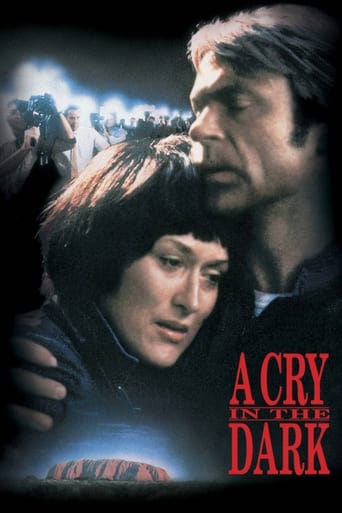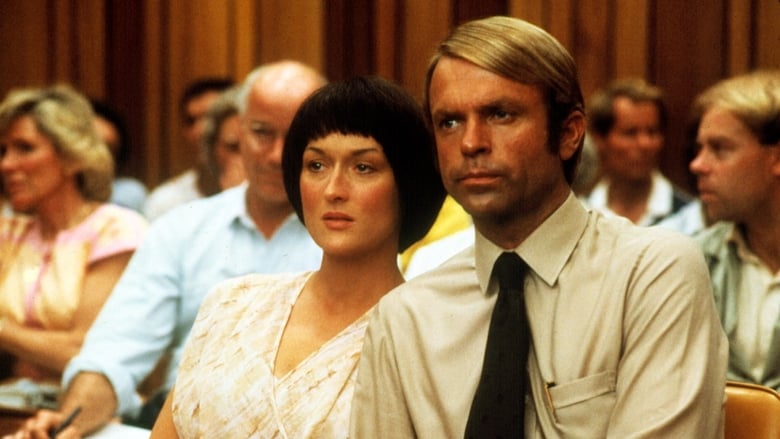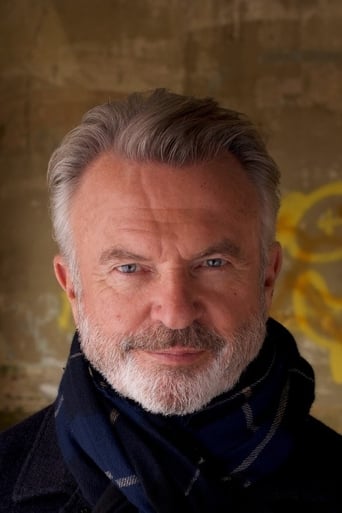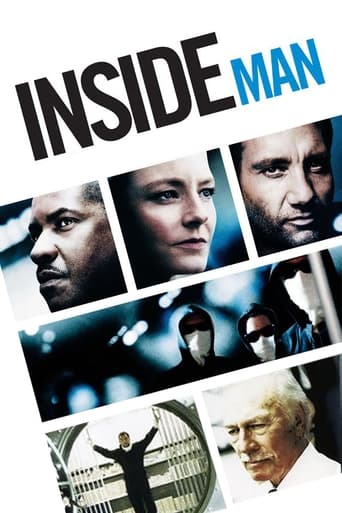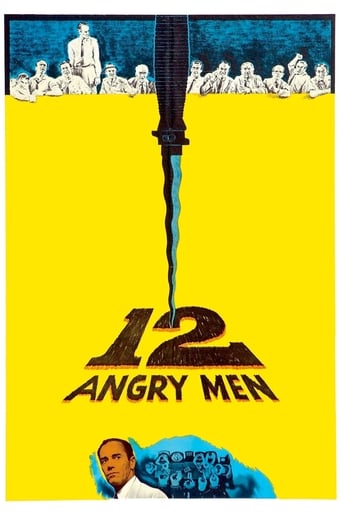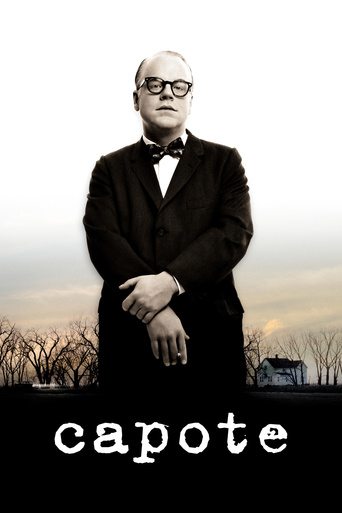Evil Angels (1988)
Based on the true story of Lindy Chamberlain who, during a family camping trip to Ayers Rock in central Australia, claimed she witnessed a dingo take her baby daughter, Azaria, from their tent. Azaria's body was never found and, after investigations and two public inquests, she is charged with murder.
Watch Trailer
Cast


Similar titles

Reviews
Based on a true story, Lindy Chamberlain (Meryl Streep) loses her baby to a dingo while camping near Ayers Rock in Australia. She and her husband Michael (Sam Neill) would go through an odyssey of lies and innuendos leading to their conviction in the murder of their child.The story moves along quite well with the two stellar leads. When I rewatched it recently, I saw the realism of the court case and the gossip that goes along with a celebrity case. I didn't really care that much about O J Simpson when it happened. But I had some time during the Casey Anthony case, and the media circus is so close to this movie. All those little real people inserts in the movie just hit the nail on the head.I also love the performances of Neill and Streep. I love when the husband started to break down. I love that after the conviction, Streep tells the guards that Neill is going to fall. I love all their interplay. The one thing I would change is to not show the dingo in the tent when it happened. I would plant a little doubt in the mind of the audience. It would cause a little bit of unease especially in the beginning. Other than that, this is perfectly made.
In August 1980 a nine-week-old baby girl named Azaria Chamberlain disappeared from a camp-site near Ayers Rock, Australia. The baby's mother Alice (generally known as Lindy) stated that her daughter had been taken by a wild dingo, and a subsequent inquest ruled that her account of events was true. That, however, was not the end of the matter. The police continued to investigate the disappearance, and eventually Lindy was charged with Azaria's murder; her husband Michael was charged with helping her dispose of the body. In October 1982 both were convicted and Lindy was sentenced to life imprisonment. (Michael was only given a suspended sentence). Several years later fresh evidence came to light which led to Lindy's release from prison; in 1988, shortly before this film was released, both the Chamberlains were acquitted by the Northern Territory Court of Appeals of all the charges against them.The "dingo baby case", as it became known, was one of the most controversial cases in Australian legal history. I remember an Australian friend coming to visit me in the early nineties, several years after Lindy and Michael Chamberlain had been exonerated, and as like me he was a keen film enthusiast I suggested that we should watch "Out of Africa" which was on television that evening. He refused point blank, stating that ever since the release of "A Cry in the Dark" he had made it a principle not to watch any film starring Meryl Streep because of what he described as her part in the "whitewashing of a notorious child-killer". My friend's attitude was by no means unusual in Australia. The case divided public opinion sharply in that country, with the majority probably believing that the Chamberlains were guilty. Gossip about them was widely repeated and quickly accepted as the truth. One thing that even the prosecution was unable to come up with was a plausible motive for the alleged crime. Those, however, who wanted to see the Chamberlains prosecuted in the court of public opinion were not so reticent. The couple were members of the Seventh-day Adventist Church- indeed, Michael was a pastor in that church- and rumour soon had it that Adventist religious doctrine demands the human sacrifice of young children in order to atone for the sins of the community. It was also widely, and incorrectly, reported in the media that the name Azaria means "sacrifice in the wilderness". Few of those who passed on these rumours had any real interest in Adventism, or how the doctrines of that church differ from those of mainstream Christianity; they merely saw the church as a bizarre and fanatical cult. This was the second film directed by Fred Schepisi in his native Australia. His first film, "The Chant of Jimmie Blacksmith", also based on a real-life murder case, was part of the Australian "new wave" of the Seventies, but soon after making it Schepisi left for Hollywood. It is a dry, factual look at the facts of the case in the manner of a television docudrama; there is little to distinguish it from a "based-on-a-true-story" TV movie except for the presence of a major international star in the shape of Meryl Streep. (That and the fact that it is more factually accurate than most TV movies). Streep gets a chance to add another to her collection of accents, having earlier in the decade bagged British ("The French Lieutenant's Woman", "Plenty"), Polish ("Sophie's Choice") and Danish ("Out of Africa"). (Some people still think of her as an actress whose main skill is the ability to reproduce foreign accents, even though since the end of the eighties she has rarely played characters who are not American, her Italian-born housewife in "The Bridges of Madison County" and Margaret Thatcher in "The Iron Lady" being the main exceptions). Here she gives an excellent performance as Lindy Chamberlain. What is so remarkable is that she is able to convey not only her Lindy's strength of personality and belief in her own innocence but also the character traits which persuaded many people that Lindy was in fact guilty. Meryl was nominated for a "Best Actress" Oscar but lost out to Jodie Foster in "The Accused". What alienated so many members of the public was Lindy's refusal to make a show of her grief and her calm demeanour and stoical acceptance of her daughter's death. This attitude was probably based on Lindy's firm religious beliefs, her conviction that Azaria's death was the will of God and that her daughter had gone to a better life in Heaven, but many people took it as cold-heartedness, even as proof of her guilt. Sam Neill is also good as Michael, a weaker character than his wife, who confronted with disaster loses faith both in God and in Lindy's innocence. "A Cry in the Dark" has many similarities to a number of British films from around this period dramatising real-life miscarriages of justice, such as "Dance with a Stranger" and "Let Him Have It". Films of this nature, quite apart from their entertainment value, also have a useful social function in that they remind us of how easily such miscarriages can occur. In Lindy Chamberlain's case the main factors appear to have been public hysteria, prejudice against a minority religion, the irresponsibility of parts of the media and flawed "expert" evidence. (Azaria's clothing was examined by a British forensic scientist with no knowledge of dingoes; a chemical sprayed on the Chamberlains' car as a sound deadener was mistaken for blood). That the Chamberlains were eventually exonerated was largely due to the chance discovery of new evidence; one wonders how many innocent people are still in jail waiting for such evidence to turn up. 7/10
The facts in the case of an Australian couple persecuted by a headline-hungry press should be familiar to viewers of the CBS news show 60 Minutes, which aired the story (not coincidentally) just before this film was released. Both versions recount the disappearance during a weekend camping trip of Lindy and Michael Chamberlain's infant daughter, and the subsequent three-ring media circus which led to wild (and totally fabricated) accusations of cult fanaticism and ritual sacrifices, and eventually to a murder conviction for the bereaved mother. But the big screen dramatization has more in mind than just a strong reprimand for misguided journalism ethics. The reporters covering the case are shown to be more ferocious than the wild dingo dog claimed by the Chamberlain's to have killed their child, but the screenplay wisely implicates public opinion as well, which condemned Lindy Chamberlain to prison for not having a telegenic personality (the same trait might also lose her sympathy with moviegoers, despite another challenging performance by Meryl Streep). Director Fred Schepisi presents the story as a straightforward, undemonstrative docudrama, letting the cold-blooded courtroom drama speak for itself, with a pair of excellent actors (Streep and Sam Neill) taking up the slack.
In August 1980 the disappearance of baby Azaria Chamberlain and the pursuant trial of her parents Lindy and Michael for the alleged murder of the child caused an uproar across what was then a very angry nation. The media and the public had already tried and convicted the accused couple and were baying for blood. What followed was a gross miscarriage of justice.Michael and Lindy Chamberlain claimed that while camping near Ayers Rock, central Australia, that a dingo had taken their ten week old daughter from their tent as they were preparing to eat in the barbecue area. No-one believed them. Lindy was charged with the murder of her baby, and Michael as an accessory after the fact. The whole country was abuzz with whispers of a ritual killing. The Chamberlain's trial was over before it began.Lindy never proved her innocence, so she was found guilty. There was never enough evidence to convict her, yet the jury was swayed by public and media pressure. How could we as a nation even sit in judgement? From where we are, how could we possibly presume to know? Unless there was absolute proof, and no reasonable doubt whatsoever, the Chamberlains should have been acquitted.Fred Schepisi's film unequivocally and whole heartedly supports the argument of John Bryson's novel, that the Chamberlains were completely innocent of the charges laid against them. That in fact a dingo did take baby Azaria on that fateful night at Ayers Rock.Schepisi has brilliantly captured the mood of a blood thirsty nation, hell bent on 'the truth' being brought to light. He shows Australia in a rather unbecoming light as a people who were totally obsessed with seeing the Chamberlains pay! His screenplay, co-written with Robert Caswell, vigorously stirs the emotions and will most certainly find the audience saddened and angered at the travesty of justice which occurred.The outstanding Meryl Streep gives an incredible performance as the woman accused of the most dreadful of acts. She brings to life most convincingly the tough little Aussie who was ready to stand up to the allegations and set the world straight. Even her accent is almost, but not quite, spot on. A very good effort by the master of that trade. Sam Neill is every bit as good as Streep as the at first faithful but then disillusioned Michael who cannot comprehend why their world is falling apart, and he starts to question his Christianity. His, as was Streep's, is a showing of great emotional strength that will move you profoundly. The entire support cast are also excellent, with some of Australia's finest actors and actresses playing a part.Technically the film is brilliant too, with Director of Photography Ian Baker capturing this great land with splendour (especially the Rock). Editor Jill Bilcock keeps the whole movie tense and very emotionally charged, while Bruce Smeaton provides a telling score.For all Aussies this is a must see, a shocking look in the mirror if you will, at what we as a country did to a family who just wanted justice to be served, and the truth to be known. As Michael Chamberlain said : "I don't think anybody really understands what innocence means.....to innocent people."Saturday, May 20, 1995 - VideoEven on return viewings Fred Schepisi's account of the travesty of justice that befell the Chamberlains, who lost baby Azaria at Ayres rock in 1980, is still emotionally powerful and honestly moving.Schepisi and Robert Caswell have expertly transferred John Bryson's novel to the screen, telling with simplicity the horrifying story of a vacation gone terribly wrong for Michael and Lindy Chamberlain, whose new born daughter Azaria was taken form the family tent by a dingo just moments after being put down.Amid media speculation and vicious public rumour Lindy was charged with the murder of her baby, and Michael was charged as an accessory after the fact. What followed was little more than trial by media, and with the Australian people determined she be put away, Lindy was found guilty and sentenced to life imprisonment with hard labour, even though the prosecution could present no motive and little other than circumstantial evidence.Meryl Streep is in top form as the accused woman who battles Australia head on to prove her innocence. She is truly awesome, and the only thing that fails her is a true blue Aussie accent, though she does her level best to sound ocker. You might wonder why a top Australian actress wasn't cast in the role, but star power is probably the answer. Alongside Meryl is an equally impressive Sam Neill, outstanding as the husband who sees his world falling apart before his eyes, while he feels powerless to do anything about it. A strong Aussie cast lend compelling support.Editing from Jill Bilcock is very timely, Ian Baker's cinematography of the rock and other rugged locations is visually brilliant and Bruce Smeaton's music is perfect for the part. Truly a must for all conscientious Australians.Sunday, June 15, 1996 - Video

